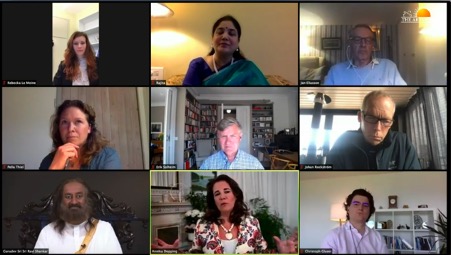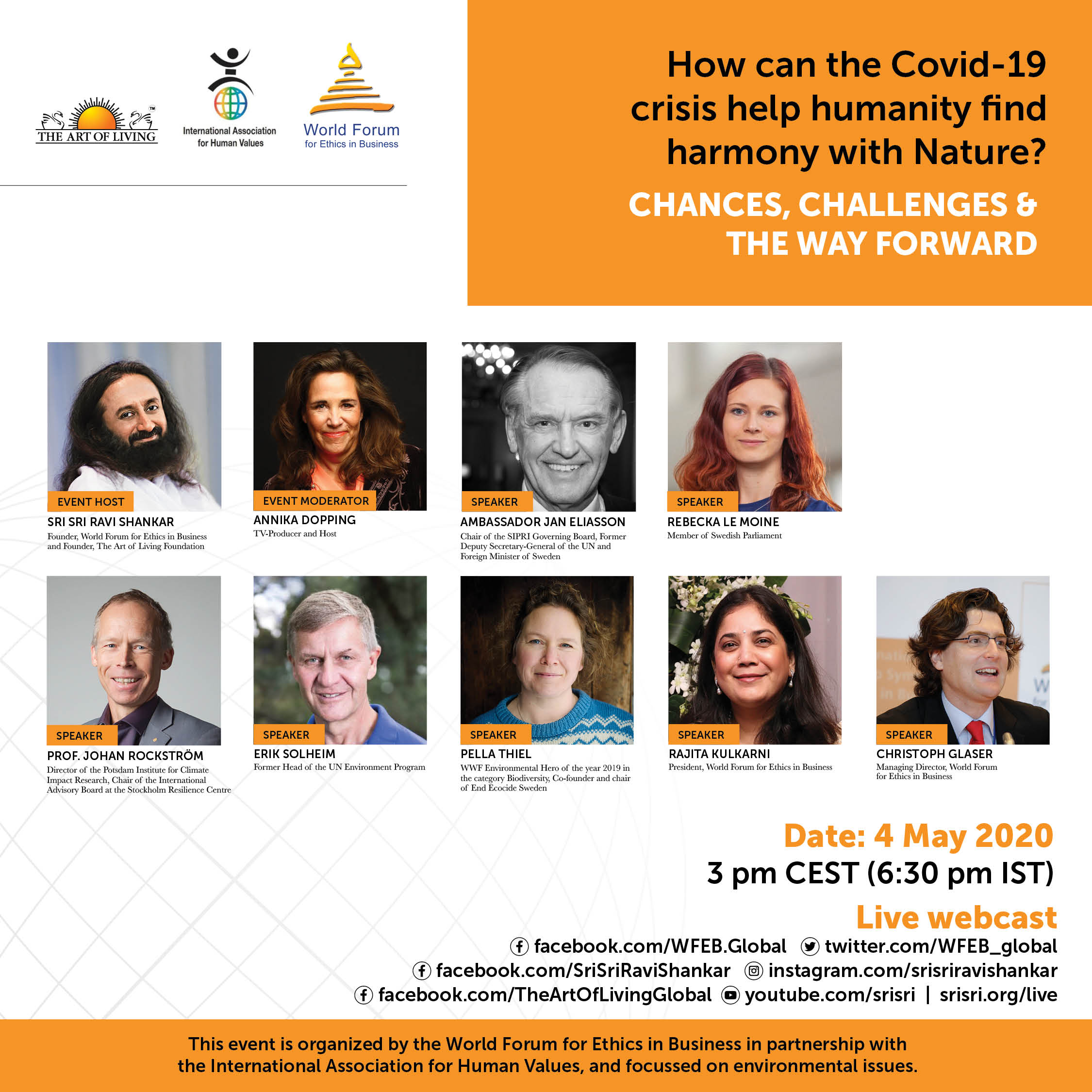
Former UNEP head Erik Solheim, international top scientist Prof. Johan Rockström, political veteran Ambassador Jan Eliasson and Sweden’s MP & environmentalist Rebecka Le Moine were among the speakers of this live online event hosted by WFEB founder Sri Sri Ravi Shankar on 4 May 2020
“How can the Covid-19 crisis help humanity find harmony with Nature? – Chances, challenges & the way forward” was the topic of this online event that was publicly streamed on social media.
The Covid-19 pandemic has clearly shown the world how quickly extreme measures can contain pollution. As countries try to limit the spread of the virus by lockdown and other national restrictions, pollution and greenhouse gas emissions have gone down. But while the immediate environmental benefits seem obvious, we however have to question if this is just a short-term change, or could it lead to longer-lasting falls in emissions and give an opportunity to scaled-up environmental programs? What will happen when the current measures are eventually lifted? Will it be just business as usual? What needs to happen for a lasting, long-term alignment with the planetary boundaries?
The World Forum for Ethics in Business for the past decades has been advocating and acting towards ethics, sustainability, good governance and sustainable values, and has held worldwide multi-stakeholder conferences for about 60.000 leaders from 80 countries. Although innumerable stories of inner transformation at a personal as well as at a corporate level have taken place, a strong resistance to comply with the Paris Agreement can still be seen.
This online discussion forum invited global sustainability experts to put into perspective the current impact of the pandemic on our future life conditions, the lessons learned and what really must be the way forward to create a long-lasting positive impact for people and the planet.
The panel comprised:
- Host: Sri Sri Ravi Shankar, Founder, World Forum for Ethics in Business and Founder, The Art of Living Foundation
- Ambassador Jan Eliasson, Chair of the SIPRI Governing Board, Former Deputy Secretary-General of the UN and Foreign Minister of Sweden
- Rajita Kulkarni, President, World Forum for Ethics in Business
- Rebecka Le Moine, Member of Swedish Parliament
- Prof. Johan Rockström, Director of the Potsdam Institute for Climate Impact Research, Chair of the International Advisory Board at the Stockholm Resilience Centre
- Erik Solheim, Former Head of the UN Environment Program
- Pella Thiel, WWF Environmental Hero of the year 2019 in the category Biodiversity, Co-founder and chair of End Ecocide Sweden and Transition Network Sweden
- Moderator: Annika Dopping, TV-Producer and Host, Communication Expert and Content Provider, Sweden
Quotes from the discussion
Rajita Kulkarni, President, World Forum for Ethics in Business
In a way this pandemic has compelled us to disrupt the way we live our lives.To innovate in the way we connect with each other. It has shown us unprecedented ways in which we can come together as a global community.
Caring for the planet, nurturing our planet is quite intrinsic to so many of our cultures around the world. The Art of Living, the International Association for Human Values and the World Forum for Ethics in Business have been united in our efforts. Volunteers have planted more than 81 million trees around the world. More than 46 rivers got rejuvenated. Earlier this year we have taken a resolution to launch a program called “Mission Green Earth” where we have taken a global pledge to plant, nourish, nurture 5 million trees in the next 5 years.
Annika Dopping, TV-Producer and Host, Communication Expert and Content Provider, Sweden
Without for a second disregarding or ignoring the terrible suffering taking place in many ways now due to the pandemic there is also a parallel truth that in every crisis is entailed an opportunity or a new beginning, an opportunity to start questioning strategies that might no longer serving us, or correcting imbalances or dysfunctional systems and start with a new governance in a wiser direction
Rebecka Le Moine, Member of Swedish Parliament
Although there is social distancing, I see people coming together in a strong solidarity. I see people becoming more humane, less stressed and more present.
This pandemic shows how vulnerable our society is.
The Corona crisis reminds us that the domination approach and lack of respect of our fellow species and nature will harm ourselves. Because we are nature. This can and must change.
An international law against environmental destruction, an ecocide law can become true if we want to. For Ecocide to be recognized 82 states must say yes to this idea.
Ambassador Jan Eliasson, Chair of the SIPRI Governing Board, Former Deputy Secretary-General of the UN and Foreign Minister of Sweden
We already today should draw lessons; lessons to be learned are very obvious. We need to remind ourselves that we are all interdependent and that we need cooperation, both inside the country and in-between countries.
How do we build back better after Corona? We must build back a better society after the crisis but at the same time deal very energetically with the situation as it is now.
The SDGS are the tool to repair the world and the program to reach what we want.
Erik Solheim, Former Head of the UN Environment Program
This crisis has shown the best and the worst of humanity. The worst is quailing between nations and quailing within nations.
The best is the outburst of solidarity and dignity. Getting out of the crisis we need to be much greener.
Christoph Glaser, Managing Director, World Forum for Ethics in Business
The question is how can we make sure that people do the right thing even if nobody is watching? We believe that leadership starts where the knowledge ends. In this global crisis we have come to a scenario where we really don’t know the way. This is new to all of us. This is when insight, mindfulness and the true connection to oneself and to the other is most important.
Prof. Johan Rockström, Director of the Potsdam Institute for Climate Impact Research, Chair of the International Advisory Board at the Stockholm Resilience Centre
It is not the pathway to a sustainable future that we need to have a virus pandemic hitting so hard that the global economy is shut down, jobs are lost and misery is created but it tells us something incredibly important and powerful: Isn’t it remarkable how we over 150 years have accepted that the only pathway to generate wealth and prosperity and development is at the cost of humans and the planet? I find that a remarkable reminder that the virus is now giving us this gift of showing us that the GDP growth-based paradigm is simply too costly. It is not acceptable neither morally, nor health-wise nor economically to pursue this kind of development at the expense that it has caused us. And we are approaching potentially irreversible catastrophic thresholds that would place all future generation in a situation that we can call today a planetary emergency. That is one important lesson from what we are facing right now.
Sri Sri Ravi Shankar, Founder, World Forum for Ethics in Business and Founder, The Art of Living Foundation
We are part of nature. We cannot be outside of nature. We are governed by the 5 elements.
Mental health is very important at this point of crisis.
Pella Thiel, WWF Environmental Hero of the year 2019 in the category Biodiversity, Co-founder and chair of End Ecocide Sweden and Transition Network Sweden
We have to stop govern nature. We have to govern ourselves in our relation to nature.
Nature has rights, all human beings have rights. How can we respect those rights_ How can we negotiate our existence in relation to the rest of the living-web.
It is time to start the discussion to balance the UN declaration of Human rights with the declaration of the rights of nature. This proposal is ongoing since 10 years and we need to extend that debate.
Erik Solheim, Former Head, UN Environment Program
The opportunity for India, for China, for Europe to transform ourselves after the crisis is tremendous but we need to reach out and avoid conflicts. At the moment we are in a difficult place when it comes to the multilateral organizations.
The main issue is the relationship between the main powers. We need to call for peace, call for cooperation because if we cooperate and coordinate, we can achieve a lot. And to also build on the re-bounce of nature.
Prof. Rockström, Director of the Potsdam Institute for Climate Impact Research, Chair of the International Advisory Board at the Stockholm Resilience Centre
We have the SDGs, we have the Paris Agreement, we have the Convention on Biodiversity but it’s a question of implementing them. The basic foundations of more resilience, a stable future are there, The solutions are out there, not only are they available but they are more attractive.
If you add the elements of responsibility and the legal obligations with Sri Sri Ravi Shankar’s points of humanism, we have a perfect cocktail for a pathway that can take us towards a much safer, just and sustainable resilient future.
Sri Sri Ravi Shankar, Founder, World Forum for Ethics in Business and Founder, The Art of Living Foundation
When greed takes over a person, when fear takes over a human psyche, they would do anything to destroy other human beings and destroy the nature as well. Violent tendencies is because of stressed mind and lack of broader vision.
We live in a globalized society today. We have to really care for human’s safety and security both through putting laws and regulations in place about biological experiments that countries are doing in different parts of the world as well as kindling the humanness that is widely present in all human beings. In this way we connect to nature, we connect to follow human beings we live a life of more peace and harmony and we can bring more prosperity to our planet.
Background
This online event was the third in the series of dedicated discussions on the impact of Covid-19. Earlier editions featured a focus on the overall ethical dimension as well as on domestic violence.
For this dedicated edition on the environmental impact, the World Forum for Ethics in Business teamed up with the International Association for Human Values. The International Association for Human Values, a UN-accredited global NGO, has carried out significant work to reduce greenhouse emission and restore nature’s balance over the past decades. This includes large scale tree plantations drives, water management and protection including cleaning polluted rivers and rejuvenating dried rivers and zero-budget chemical-free farming that is both economically and organically sound.
About the World Forum for Ethics in Business
The World Forum for Ethics in Business is a registered public interest foundation based in Belgium. The mandate of the Forum includes all manners of pursuing and establishing the indispensable ethical foundations of business in a globalized world. Providing a platform for the promotion and defense of ethical approaches to business enterprise and corporate governance and facilitating global dialogue and fostering cooperation among the private sector, the academic world, government agencies, international organizations, the media, spiritual as well as secular communities and all other stakeholders are among the organization’s main objectives. For the past 16 years, the WFEB has convened in worldwide conference and since 2006 regularly at the European Parliament in Brussels to advocate and act towards ethics, sustainability, good governance and shared value. For further information visit www.wfeb.org
Contact:
press(at)wfeb.org

